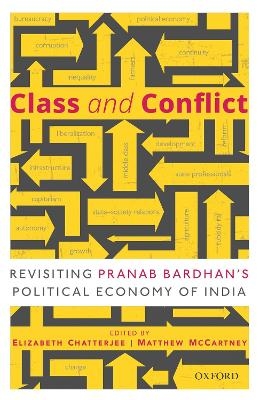
Class and Conflict
OUP India (Verlag)
978-0-19-949968-7 (ISBN)
Exploring the continuities and changes that have characterized India's political economy since 1984, this volume takes stock of the main challenges of India's economic development today. It contributes to current debates on economic growth, crony capitalism, agrarian crisis, the politics of class and caste, and the role of the state in a liberalizing economy.
Elizabeth Chatterjee is lecturer in Regional and Comparative Politics at Queen Mary University of London. Matthew McCartney is associate professor of the department of Political Economy and Human Development of South Asia at the University of Oxford.
Acknowledgements
List of figures and tables
Part I. Overview
1. Elizabeth Chatterjee and Matthew McCartney, 'Revisiting The Political Economy of Development in India'
2. Pranab Bardhan, 'Reflections on Indian Political Economy'
Part II. The Indian Economy Three Decades On
3. Matthew McCartney, 'The Stagnation Debate: An Enduring Legacy'
4. Maitreesh Ghatak and Ritwika Sen, 'Growth and the Subsidy Raj in India: Re-examining the Bardhan Hypothesis'
5. James Manor, 'India's Political Economy: Has Something Crucial Recently Changed?'
Part III. The Dominant Proprietary Classes: Continuity and Change
6. Rob Jenkins, 'Business Interests and State Autonomy in India'
7. John Harriss, 'The Second Dominant Proprietary Class: Rich Farmers and the Political Economy of Indian Development'
8. Elizabeth Chatterjee, 'All Shook Up? State Professionals in the Reform Era'
Part IV. New Elites
9. Leela Fernandes, 'Rethinking the Dominant Proprietary Classes: India's Middle Classes and the Reproduction of Inequality'
10. Barbara Harriss-White, Muhammad Ali Jan, and Asha Amirali, 'Malgudi on the Move: Bardhan's Political Economy and the Rest of India'
Part V. Conclusions
11. Michael Walton, 'An Indian Gilded Age? Continuity and Change in the Political Economy of India's Development'
Index
About the editors
| Erscheinungsdatum | 14.03.2020 |
|---|---|
| Verlagsort | New Delhi |
| Sprache | englisch |
| Maße | 149 x 222 mm |
| Gewicht | 472 g |
| Themenwelt | Geschichte ► Teilgebiete der Geschichte ► Wirtschaftsgeschichte |
| Wirtschaft ► Volkswirtschaftslehre ► Wirtschaftspolitik | |
| ISBN-10 | 0-19-949968-3 / 0199499683 |
| ISBN-13 | 978-0-19-949968-7 / 9780199499687 |
| Zustand | Neuware |
| Haben Sie eine Frage zum Produkt? |
aus dem Bereich


